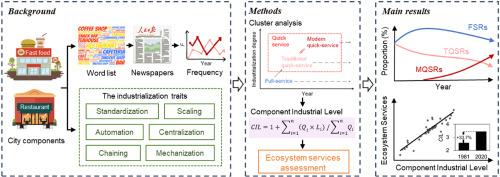通过城市组成部分的产业升级加强生态系统服务:来自中国餐饮业的见解
IF 10
1区 环境科学与生态学
Q1 ENGINEERING, ENVIRONMENTAL
引用次数: 0
摘要
工业革命以来,工业化提高了城市生产效率,降低了成本,促进了城市的可持续发展。尽管城市工业化研究进展迅速,但对其演变过程的定量分析仍然具有挑战性。本研究以餐馆为例,运用文化组学这一通过数字文本数据研究社会演化的定量方法,对1981 - 2020年中国城市要素的工业化演化进行量化,并探讨其所提供的生态系统服务的变化。采用聚类分析方法,将餐厅划分为现代快餐店、传统快餐店和全服务餐厅三种类型。结果表明:1981年以来,中餐馆迅速向工业化方向发展,构成工业水平(CIL)增长了33.7%,这是三种餐馆类型的平均工业水平。在所有餐厅中,mqsr的比例增加到28%,超过了tqsr。此外,mqsr提供更多的生态系统服务,是tqsr的1.7倍。随着CIL的改善,餐馆提供的生态系统服务增加了27%。越来越多的mqsr品种、人们的积极选择和社会经济因素进一步促进了工业化。然而,这一进展也带来了负面服务。我们必须关注这些发展,并实施适应性管理战略,以应对新出现的挑战。本研究将生态与文化演化研究相结合,为研究城市演化提供了新的视角,有助于增强城市活力和可持续性。本文章由计算机程序翻译,如有差异,请以英文原文为准。

Strengthening ecosystem services through industrial upgrading in city components: Insights from restaurants in China
Since the Industrial Revolution, industrialization has improved city production efficiency and reduced costs, promoting sustainable urban development. Despite rapid progress in city industrialization research, quantitative analysis of its evolution process remains challenging. Using restaurants as a case study, this study uses culturomics, a quantitative method for exploring social evolution through digital text data, to quantify the industrialization evolution of city components from 1981 to 2020 in China and explore the changes in the ecosystem services they provide. Using cluster analysis, we divided restaurants into three types: modern quick-service restaurants (MQSRs), traditional quick-service restaurants (TQSRs), and full-service restaurants (FSRs). The results indicate that Chinese restaurants have rapidly evolved towards industrialization since 1981, with an increase of 33.7 % in the component industrial level (CIL), which is the average industrial levels of the three restaurant types. Among all the restaurants, the proportion of MQSRs has increased to 28 %, surpassing TQSRs. Moreover, MQSRs provide more ecosystem services, 1.7-times greater than TQSRs. As the CIL has improved, the ecosystem services provided by restaurants have increased by 27 %. The increasing variety of MQSRs, people's active choices, and socioeconomic factors have further promoted industrialization. However, this progress has also introduced negative services. We must pay attention to these developments and implement adaptive management strategies to address emerging challenges. Combining ecological and cultural evolution research, this study provides a novel perspective on city evolution, thereby contributing to enhance city vitality and sustainability.
求助全文
通过发布文献求助,成功后即可免费获取论文全文。
去求助
来源期刊

Journal of Cleaner Production
环境科学-工程:环境
CiteScore
20.40
自引率
9.00%
发文量
4720
审稿时长
111 days
期刊介绍:
The Journal of Cleaner Production is an international, transdisciplinary journal that addresses and discusses theoretical and practical Cleaner Production, Environmental, and Sustainability issues. It aims to help societies become more sustainable by focusing on the concept of 'Cleaner Production', which aims at preventing waste production and increasing efficiencies in energy, water, resources, and human capital use. The journal serves as a platform for corporations, governments, education institutions, regions, and societies to engage in discussions and research related to Cleaner Production, environmental, and sustainability practices.
 求助内容:
求助内容: 应助结果提醒方式:
应助结果提醒方式:


